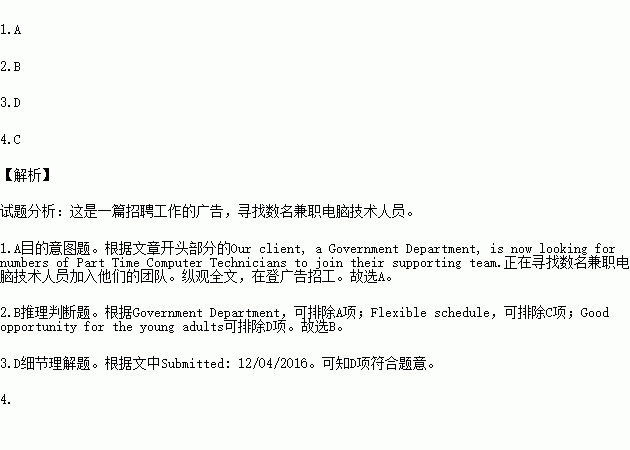题目内容
Computer Technician (Part Time Student Helper)
· Government Department
· Flexible schedule
· Good opportunity for the young adults
Our client, a Government Department, is now looking for numbers of Part Time Computer Technicians to join their supporting team.
Job Responsibilities
· Responsible for answering queries to end users on the use of computer and electronic systems and facilities
· Provide general technical support to end users
·Handle, on regular health checks on equipment, reset problem terminals and reinstall software
Job Requirements:
·Diploma/ higher diploma in Computer Science or related discipline obtained from Hong Kong University / IVE or above
·Part-time experience in Customer Services and/or IT support is an advantage
· Good at verbal and written English, Cantonese and Mandarin
· With basic knowledge or experience in IT networking
· Good working attitude, energetic and self-motivated candidate is highly preferred
· Students in Year 1 and Year 2 are preferred
· Training will be provided
Attractive remuneration (报酬) package will be negotiated to the right candidate.
Interested parties please email a MS Word Version resume and expected salary to technology @man power professional, com. hk (CC: iris. cheung @ manpower-professional. Com. hk) and quote the job reference.
Job Ref: 506-111213-IR
Job Type: Contract
Location:
Start Date: ASAP
Duration:
Salary/Rate :
Contact: Iris Cheung
Open To: Hong Kong Residents Only
Submitted: 12/04/2016
1.The main purpose of this passage is to_________.
A. advertise a job B. introduce a company
C. introduce a career D. advertise a course
2.The job has a lot of benefits EXCEPT________.
A. working in a government department
B. a high salary
C. flexible working plan
D. opportunities for young adults
3.If someone wants to apply for the job, he must________.
A. have graduated from IVE
B. have been trained before
C. be a student in Year 1
D. submit his applications by 12/04/2016
4.The job will be offered only to__________.
A. citizens from Hong Kong B. university students
C. computer technicians D. young people

